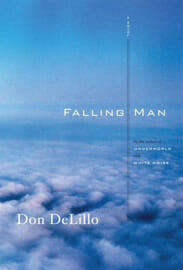
Fiction after the walls come tumbling down
To possess such talent as Don DeLillo and then target the very real heartbreak and human drama of 9/11 as some whiff of voyeurism or indiscretion that seems nearly cruel, almost brutal. Is it wrong? Should the author be whipped and mocked for sifting New York’s settling ashes now, or ever? Or is this manner of coming to terms with loss totally necessary, and even outrageously funny at times, with laughter, that great medicine, liberally applied? These are some of the many questions that course through the mind while reading DeLillo’s soaring latest effort, Falling Man. It’s a much welcomed return to the author’s best work, after the less-than-satisfying Cosmopolis (2003), a book that doggedly follows a billionaire across Manhattan in search of a haircut—hard to accept, in any sense, as a necessary read.
What is necessary, it turns out, is moving on. Most of us relive that day, 9/11, when our courage can actually be screwed to the sticking point, through feature films, documentaries, books, reports and various other seemingly disjointed tales that crossroad, connect briefly and then move on. Here, in a welcome turn, DeLillo distills the wacked-out post-9/11 haze into a touching read (piercingly funny, at times, despite every jangling instinct) that offers much sense, in its fine prose, for utter senselessness.
DeLillo unspools the kind of storyline late filmmaker Robert Altman no doubt loves right now, looking down with interest from his big director’s chair in the sky at the ultimate movie. As in Nashville and Gosford Park and other Altman Alt-realities, DeLillo characters cross and uncross paths—all seeking, searching, assessing and reassessing their lives—in the dazed, near-apocalyptic hangover that blanketed New York City in the wake of the twin towers falling like Jericho’s walls.
The novel opens with a lens on protagonist Keith Neudecker. He is fleeing from the World Trade Center, finding his way blindly to the apartment of his wife, from whom he’s separated. The opening incident sets off a series of scenes that go from a jarring, confusing, chaotic frenzy to a kind of slow-motion, who’s-left-here hell:
It was not a street anymore but a world, a time and space of falling ash and near night… The roar was still in the air, the buckling rumble of the fall. This was the world now. Smoke and ash came rolling down the streets and turning corners, busting around corners, seismic tides of smoke, with office paper flashing past, standard sheets with cutting edge, skimming, whipping past, otherworldly things in the morning pall.
From this tsunami of strangeness, the book unfolds into the struggling, webbed association of acquaintances, family and loved ones. These last include Keith’s wife, Lianne, and their son, Justin, along with Lianne’s mother, Nina, who offers this great line, “What old dead wars we fight. I think in these past days we’ve lost a thousand years.” There’s also Nina’s leftist lover, Martin. The reader should know—and it’s hard to find a decipherable motive—that the book also touches on the last moment of one of the hijackers. This (gratuitous?) vignette added very little, except perhaps to remind us that the crematory dust that settled over Manhattan contained more than just powdered brick and mortar.
It’s also important to note—and strange in telling at this remove—that this is not the first time DeLillo has written of the World Trade Center. In his 1977 novel, Players, one of his characters portentously makes this comment on the WTC: “The towers didn’t seem permanent. They remained concepts, no less transient for all their bulk than some routine distortion of light.”
Spooky.
DeLillo’s clean economical style presents readers with exactly what many people must have felt that day but inadequately described—or even comprehended. Especially for those of us in New York, the flight through these pages can hurt in a real, if removed and numbed, way. But here’s an honest, fastidious and insightful—not voyeuristic, in the end, not at all—work of American literature, our finest yet on 9/11. In short, a totally necessary read.